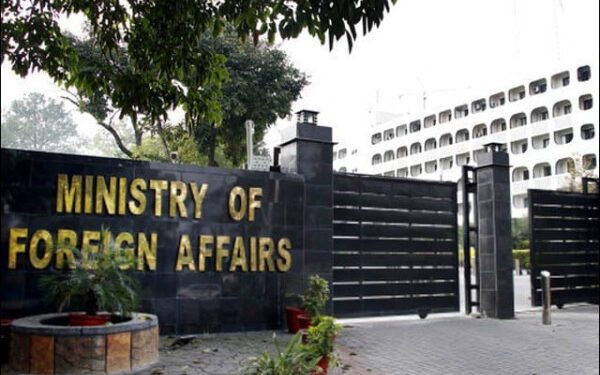Islamabad :Pakistan has issued a strong condemnation of recent Israeli airstrikes on Iranian territory, labeling the actions as unjustified aggression and a serious threat to regional peace. In an official statement released by the Ministry of Foreign Affairs, Pakistan reaffirmed Iran’s legitimate right to self-defense and called upon the international community, including the United Nations, to take immediate action to halt Israeli provocations.
This stern response comes amid heightened tensions in the Middle East, following Israel’s reported military strikes on Iranian infrastructure, which have resulted in casualties, destruction, and increasing diplomatic fallout across the region.
Pakistan Decries Violation of Iran’s Sovereignty
In its official response, Pakistan’s Foreign Office expressed grave concern over the attack, stating that Israeli airstrikes constitute a blatant violation of Iran’s sovereignty and territorial integrity. The statement denounced the Israeli action as illegal under international law and the UN Charter, especially citing Article 2(4) which prohibits the threat or use of force against the territorial integrity or political independence of any state.
The statement read:
“Pakistan strongly condemns the unjustified and illegal aggression carried out by Israel against the Islamic Republic of Iran. This act is a clear breach of Iran’s sovereignty and contradicts the core principles of international law and the UN Charter.”
Right to Self-Defense: Iran Protected Under Article 51 of UN Charter
Pakistan further emphasized that Iran has the full right to defend itself, invoking Article 51 of the United Nations Charter, which recognizes a nation’s inherent right to individual or collective self-defense if an armed attack occurs.
“The Islamic Republic of Iran, under Article 51 of the UN Charter, has the legitimate right to protect its territorial sovereignty and defend its people from foreign aggression,” stated the Foreign Office spokesperson.
This expression of support underlines Pakistan’s solidarity with its neighbor and reiterates the importance of upholding international norms in the face of growing instability in the region.
Regional Peace and Security at Stake
The Foreign Office warned that the Israeli attacks could have severe and far-reaching consequences for the peace and security of the entire Middle East. Such unilateral military action not only escalates tensions but also threatens to destabilize an already fragile geopolitical environment.
“These irresponsible actions by Israel pose a grave threat to regional peace, security, and stability. If not curtailed, they could lead to a broader military conflict with catastrophic consequences,” the statement said.
Pakistan’s condemnation echoes the growing chorus of concern among several Muslim-majority nations, which view Israeli actions as provocative and destabilizing.
Call to the International Community: Uphold International Law
Pakistan’s statement urged the international community, including the UN Security Council, to act swiftly and decisively. It called on world powers and international organizations to play their role in stopping Israel’s military aggression and holding it accountable for violating international norms.
“The international community must uphold the rule of law, ensure Israel’s accountability for its illegal actions, and take immediate steps to stop this aggression before the situation spirals further out of control,” the Foreign Office said.
Pakistan has historically supported peaceful resolutions to international disputes and has repeatedly emphasized the importance of multilateral diplomacy and adherence to international legal frameworks.
Strong Solidarity with Iran
Pakistan, a neighboring country to Iran with close diplomatic and religious ties, expressed deep solidarity with the Iranian government and people. The statement described the Israeli actions not just as an attack on Iran, but as an assault on peace, justice, and the principles of coexistence in the region.
In recent years, Pakistan and Iran have steadily enhanced their bilateral ties in areas such as trade, energy cooperation, border security, and regional stability. Islamabad’s response reflects this growing strategic partnership and its firm stance against foreign aggression targeting its neighbors.
Background of the Conflict: Tensions Escalating in the Middle East
The condemnation from Pakistan follows recent airstrikes by Israeli forces on key targets inside Iran, believed to be retaliation for Iranian support to resistance groups in Lebanon, Syria, and Gaza. The long-standing hostility between Israel and Iran has now intensified, with military confrontations expanding beyond traditional flashpoints like Gaza and Lebanon.
Observers warn that the latest strikes could ignite a regional war, pulling in various stakeholders including Hezbollah in Lebanon, Syria, Gulf states, and possibly global powers like the United States and Russia. The regional balance of power remains volatile, and the potential for miscalculation is high.
Pakistan’s Consistent Position on Middle Eastern Conflicts
Pakistan has consistently maintained a principled stance on conflicts in the Middle East, advocating for peaceful resolution through dialogue and diplomacy. It has opposed foreign military interventions and unilateral actions that breach sovereignty and international law, whether in Syria, Palestine, Iraq, or Iran.
Islamabad has also regularly voiced strong support for the Palestinian cause and condemned Israeli military actions in Gaza and the West Bank. The latest statement fits into Pakistan’s broader foreign policy outlook that supports Muslim-majority nations’ sovereignty and stability.
UN and OIC Engagement: Need for Collective Action
The situation calls for collective action from international forums, especially the United Nations and the Organization of Islamic Cooperation (OIC). Pakistan is likely to coordinate with other OIC member states to raise the issue at the upcoming OIC Foreign Ministers’ meeting and to propose a unified diplomatic and legal response to the crisis.
Pakistan may also advocate for a UN Security Council emergency session to address Israel’s actions and call for a ceasefire and diplomatic de-escalation.
Implications for Regional Geopolitics and Pakistan’s Role
The escalation in tensions between Iran and Israel has direct geopolitical implications for Pakistan, which shares a long border with Iran and plays a key role in regional security dynamics. Any spillover of conflict could threaten Pakistan’s security, energy supply lines, and trade corridors, especially amid ongoing efforts to strengthen regional connectivity through projects like the China-Pakistan Economic Corridor (CPEC).
Additionally, Pakistan may face increased pressure to balance its relations with both Gulf Arab allies—some of whom have normalized ties with Israel—and Iran, a traditional neighbor with deep cultural and sectarian linkages to Pakistan’s Shia population.
Conclusion: Pakistan Urges De-Escalation and Justice
Pakistan’s condemnation of Israeli aggression against Iran is a clear warning against destabilizing unilateral actions in an already tense region. Reaffirming Iran’s right to self-defense and sovereignty, Pakistan has joined other voices in urging the international community to act before the situation worsens further.
The statement sends a strong message that regional peace cannot be achieved through military might and violations of international norms, but through diplomacy, mutual respect, and adherence to global legal frameworks.

























